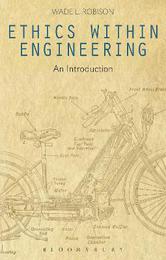
|
Ethics Within Engineering: An Introduction
Paperback / softback
Main Details
| Title |
Ethics Within Engineering: An Introduction
|
| Authors and Contributors |
By (author) Wade L. Robison
|
| Physical Properties |
| Format:Paperback / softback | | Pages:304 | | Dimensions(mm): Height 216,Width 138 |
|
| Category/Genre | Ethics and moral philosophy
Engineering - general |
|---|
| ISBN/Barcode |
9781474286053
|
| Classifications | Dewey:174.962 |
|---|
| Audience | | Tertiary Education (US: College) | |
|---|
| Illustrations |
13 b/w illustrations
|
|
Publishing Details |
| Publisher |
Bloomsbury Publishing PLC
|
| Imprint |
Bloomsbury Academic
|
| Publication Date |
15 December 2016 |
| Publication Country |
United Kingdom
|
Description
Engineering begins with a design problem: how to make occupants of vehicles safer, settle on an inter-face for an x-ray machine or create more legible road signs. In choosing any particular solution, engineers must make value choices. By focusing on the solving of these problems, Ethics Within Engineering shows how ethics is at the intellectual core of engineering. Built around a number of engaging case studies, Wade Robison presents real examples of engineering problems that everyone, engineer or not, will recognize, ranging from such simple artifacts as toasters and the layout of burners and knobs on a stove top to the software responsible for the Columbia airliner crash. The most dramatic examples center on error-provocative designs: designs that provoke mistakes for even the most intelligent, well-informed, and highly motivated. These examples all raise ethical issues, posing questions for the reader, forcing the give-and-take of discussion in classrooms and the consideration of alternative solutions that solve the original design problem without the unfortunate features of the original solution. This original, focused approach provides an ideal entry point for anyone looking to better understand professional ethical responsibilities within engineering.
Author Biography
Wade L. Robison is Ezra A. Hale Professor in Applied Ethics at Rochester Institute of Technology, USA.
ReviewsThis text will be of great value for engineering students and practicing engineers, helping them understand the repercussions of their design decisions and the requirements for being a professional engineer. * CHOICE * In this fine book, Wade Robison has provided a readable introduction to the central issues of engineering ethics conceived as integral to the core activity of the profession of engineering: design. Unlike many engineering ethics courses and textbooks, Ethics within Engineering focuses on the "internal" design choices, the value judgments which form the intellectual and creative soul of engineering. This book should be required reading for engineering students and instructors alike. -- Eric Katz, Professor of Philosophy and Chair of the Department of Humanities, New Jersey Institute of Technology, USA Ethics within Engineering nicely encapsulates the ways that ethics enters in-and is integral to-every stage of the engineering design process. Not only does it raise the ethical issues in design, it also offers a set of straightforward principles and ideas to help guide one's moral thinking. The book's clear and conversational style makes it an excellent choice for an undergraduate course in engineering ethics, or for anyone interested in the moral responsibilities of professional engineers. -- Mark C. Vopat, Professor of Philosophy and Director of the Dr. James Dale Ethics Center, Youngstown State University, USA This book is evidence that there are concepts central to the ethical design and use of technological artifacts which no one has yet put into words. Dr. Robison has written a book with clear examples and analysis that will ignite discussions about engineering ethics between students and instructors in both engineering and ethics classrooms. It deserves to be widely read. -- Adam Potthast, Associate Professor of Philosophy, Park University, USA Engaging, insightful, and very thought-provoking, Robison demonstrates that ethics is integral to the study and practice of engineering. This should be required reading for all engineering students. -- Deborah S. Mower, Professor of Philosophy and Religious Studies, Youngstown State University, USA
|